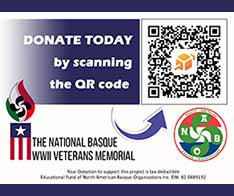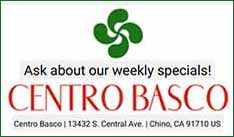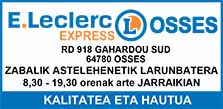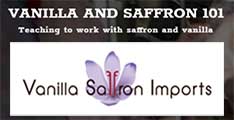Tom Major. A group of 50 visitors from Spain's Basque Country have visited north Queensland during the past week, some returning to a land they left as children when their parents returned home.
While the first Basques arrived in north Queensland from 1910 and into the 1920s, it was the subsequent wave of post-war migrants which built the community of today.
Trip organiser and Ingham-born Basque, Amaia Urberaga said the story of Basques in Australia was little known in either country.
"There was a generation of young canecutters who had to come to Australia for different reasons," she said.
"Some didn't want to do military service, some couldn't make it until the end of the month."
Operations Emu, Eucalyptus and Kangaroo
Three migrant recruitment drives — known as operations Emu, Eucalyptus and Kangaroo — brought the hardy Basque workers to north Queensland in the 1950s.
Ms Urberaga's father organised the transport of more than 700 canecutters, to alleviate the labour shortage following World War II.
Canecutting gangs were often organised along ethnic lines, with Greek, Yugoslav, Italian and other southern European men forming many teams.
"Dad was asked by the Australian government, could he go over to the Basque Country to recruit young 17, 18, 19 year-old single men," Ms Urberaga said.
"The word was getting around here that the Basque canecutters were pretty good, so the more the better."
Following the development of the first mechanical cane harvesters in the 1960s, many Basque cutters returned home.
The Spanish economy was much improved and for those who had not married, family was a strong motivator to return.
But many Basque families, particularly those from the first wave of migration before the war, had integrated into Australian life.
Teresa Guardiola was raised at Ayr, south of Townsville, before marrying a Basque man and moving to Spain while her family stayed put.
"I think they thought that this was an easier country to live in," she said.
"They just settled here, they went back on holidays, my brothers went over, got married there and came back here.
"They were Australians, they were Basque but they were Australians."
Documentary shines light
A crew filming a documentary for Basque regional television, Euskal Telebista, aimed to better educate the public about the story of the Basque diaspora.
Only one-third of those living in the Basque Country, bordering France in northern Spain, speak the language, making cultural revival a key aim for cultural organisations.
Ms Urberaga is also a member of the Basque Australian Association based in Gernika, which was formed to unite Basques who lived and worked in Australia.
"We decided about a year ago, 'Let's get together for lunch', see how many canecutters we can get together," she said.
"We thought maybe 100, in the end 250 [attended].
"We want to get a book or something, write stories about the canecutters who came here for the next generation."
Culture stays strong
Important cultural events for the Basques include the famous Running of the Bulls in Pamplona and St Ignatius Day on July 31, celebrating the patron saint of Basque Country.
Suppression of Basque language and culture under the dictatorship of Francisco Franco, who ruled from 1939 to 1975, led to a decline in numbers of native speakers only slowly being reversed.
Teresa Guardiola has participated in the korrika, a 10-day relay run to promote the Basque language, running a kilometre of the event on behalf of Australian Basques.
"This year I had the privilege to run for the Basque people here, they elected me to run," she said.
Townsville's Basque Club has about 300 members and served as another rallying point for the community.
"It's just eating and drinking and getting together," Ms Guardiola said.
"After this third generation [in Australia], it may be harder to keep the language going, but they'll keep up the culture."



 Lagun bati bidali
Lagun bati bidali Komentarioa gehitu
Komentarioa gehitu








